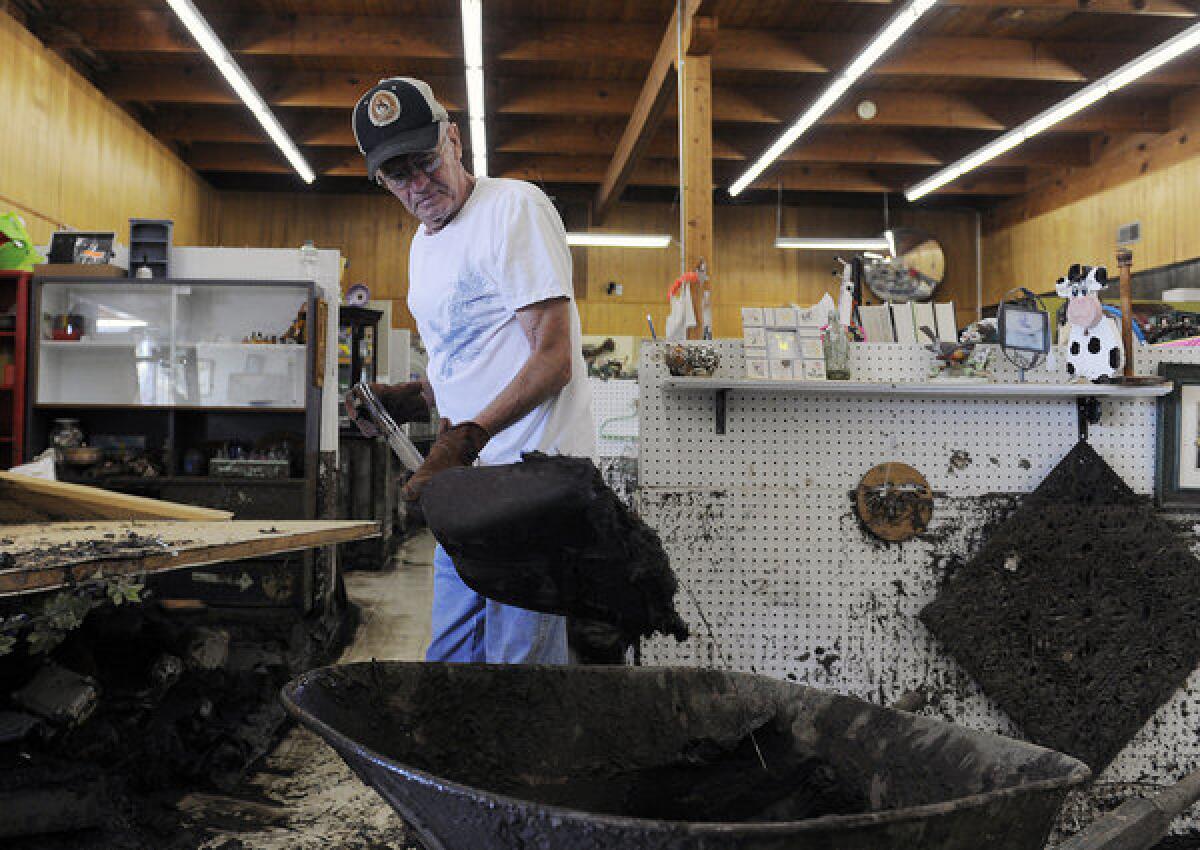E. coli in water supply adds to woes in flooded Lyons, Colo.

The residents of the foothill town of Lyons, hit hard by Colorado flooding, have another misery piled on their already destroyed and damaged homes, businesses and roads: the potentially deadly E. coli bacteria has been found in the town’s water system.
“We don’t want you using any of the water,” Lyons’ town administrator, Victoria Simonsen, said during a town hall meeting, which was broadcast online because the town is all but evacuated.
There’s no timeline for when the water and sewer systems will be restored, Simonsen said. Many of Lyons’ residents were evacuated by a convoy of National Guard troops last week. If they want to return to a town that also lacks electricity and gas, officials said, they do so at their own risk.
“It is critical we get [the water system] back up, and get it disinfected before we would ... want any of you to be back,” Simonsen said.
E. coli is potentially deadly and can cause bloody diarrhea, dehydration and kidney failure.
The finding is among the many woes compounding rescue and recovery efforts in the state, where record floods across 4,500 square miles have wiped out thousands of homes, torn through bridges, damaged oil storage tanks and left seven dead, with three others presumed dead.
On Saturday, the number of people still unaccounted for stood at 60 -- down from 80 on Friday.
Officials hope the number of missing persons will continue to drop as more rescue missions and house checks are performed, phone lines are restored and registrations at evacuation centers and online databases become more up to date. At the peaks of the flooding last week, about 1,200 people were unaccounted for.
“As we get into the middle or latter part of next week, we’ll have a list of people who truly are missing or unaccounted for. And a certain number of them will be dead,” said Larimer County Sheriff’s spokesman John Schulz.
Larimer County -- a largely mountainous county north of Boulder along the Wyoming border -- has become the focus of rescue and recovery efforts.
County investigators are zeroing in on Big Thompson Canyon, where the Big Thompson River meets the plain, forming a natural collection area for the debris of washed-out homes and businesses, Shulz said.
Investigators are conducting a “meticulous” search of the debris, he said.
Elsewhere in Larimer County, rescue crews are checking in on the 327 people who opted to shelter in place. Some are now deciding to evacuate their homes, Schulz said. Many roads are still impassable, and the sheriff is putting up roadblocks. Officials are investigating whether inaccessible areas can be reached via hiking trails or on all-terrain vehicles.
As of Saturday, 1,196 have been rescued in Larimer County. Relief efforts are benefiting from favorable weather. The county saw partly cloudy skies Saturday.
Statewide, oil and gas spills remain a chief concern as officials assess the damage. The state’s Oil and Gas Conservation Commission said Saturday that more than 25,000 gallons of oil are known to have been released across the state, an amount equal to two 300-barrel storage tanks.
The state described six of the spills as “notable,” with 12 other sites showing signs of a spill. But investigators have not been able to survey the damage in some areas because of mud and high water.
The National Guard reported Saturday rescues of 3,233 people and 1,047 pets. Statewide, nearly 6,000 remained under evacuation orders. About 200 are staying in nine shelters. The flood zone has been reduced by more than half, but it still measures almost 2,000 square miles, according to state figures.
State officials have estimated that as of Saturday, the flooding has damaged or destroyed 17,983 homes and 968 commercial properties.
More than 12,000 state residents have applied for assistance from the Federal Emergency Management Agency, and more than $12.3 million in aid has been approved, according to an official statement.
Vice President Joe Biden and his wife, Jill, will visit the state Monday, the White House said.
ALSO:
Kansas professor put on leave after controversial tweet
Texas, running low on lethal drug, continues executions
Chicago bloodshed continues: 6 hurt, 5 dead in separate gun attacks
Twitter: @MattHjourno[email protected]
More to Read
Sign up for Essential California
The most important California stories and recommendations in your inbox every morning.
You may occasionally receive promotional content from the Los Angeles Times.











